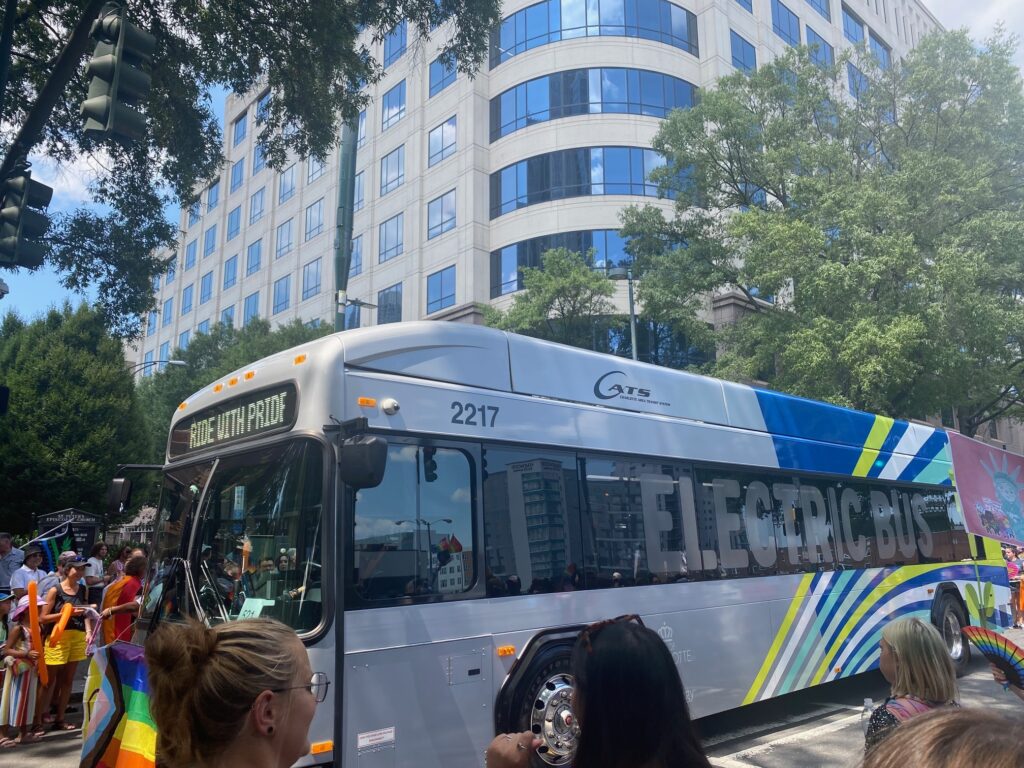Metropolitan Transit Commission: August 23

CATS Bus at Pride Festival
The Metropolitan Transit Commission (MTC) met on Wednesday, August 23 to receive updates from CATS CEO Brent Cagle and the transit work group that is focusing on finding solutions to recent operational problems at CATS. CATS staff also shared Title VI adjustments, and the MTC voted on adjustments to the CATS safety plan.
Transit work group update
Mayor of Matthews John Higdon provided a summary of the recent transit work group meeting. Currently, the Federal Transit Administration (FTA) is conducting a two-pronged review of CATS: financial and operational. Phase one (assessment) of the financial management review is complete, and phase two (testing) is expected to be completed in September. Phase three will consist of a report of the first two phases’ findings and is expected to be finalized in late fall. The operational review has not yet started as CATS waits for FTA to select a contractor to complete the review. The operational review is expected to take three to four months to complete.
CATS CEO report
CATS CEO Brent Cagle began his report with the news that the LYNX Gold Line service has been reduced from every 20 minutes during service hours to every 30 minutes. This change is due to a rail operator shortage, but new classes of operators are being hired and trained for an expected return to 20-minute service in four months. For now, Cagle says the focus is on providing reliable service on the Gold Line.
NCDOT has continued to conduct spot inspections of CATS operations with here announced inspections occurring in the past month. The good news is that no findings were reported, but some recommendations were offered to improve internal track inspections.
Informational items
CATS staff gave a brief update on Title VI procedures and resulting service impact adjustments. Since CATS receives federal funding, the department must comply with federal regulations called Title VI that address race, color, and national origin discrimination. Over the past three years, CATS has only received eleven Title VI complaints. And CATS bus route amenities and services surpass federal benchmarks. In other words, CATS is either meeting or exceeding expectations. Nice job!
In August 2022 CATS reduced frequency on eleven bus routes and discontinued late-night or early-morning trips on nine routes. Since these changes have been in place for one year, the FTA requires CATS to perform a Title VI analysis. CATS has determined that the changes resulted in a higher number of passengers per hour on each route and none of the routes have reached capacity, meaning no passengers are left at the bus stop because of space constraints. As a result, CATS concluded that no disparate impact has fallen on minority and low-income riders as a result of the frequency changes.
Action items
Next on the docket was a vote on CATS’ updated safety plan. No major changes were made to the plan. Instead, the updates consisted of a few general edits for clarification and changing language from future tense to active tense to reflect the status of current activities. The plan brought before the MTC has been through three iterations and was drafted with NCDOT. MTC passed the updated plan unanimously. You can find the CATS Safety Plan with markups in the meeting agenda from p.161 to p.314.
Transit Services Advisory Committee (TSAC) Report (and our take)
TSAC Co-Chair Jarrett Hurms wrapped up the meeting with a strong message that we agree with: We are glad that service reliability is improving, but we strongly encourage CATS to focus on increasing frequency.
The longer that riders have to wait for a bus, even if it comes on time, the less likely they are to choose to take public transit in the first place. If a rider misses a bus that comes every thirty minutes, they then have to wait another thirty minutes to get where they are going. And if the rider needs to take more than one bus to get to work, they may miss their connecting bus entirely. That time could be the difference between keeping or losing a job.
In short, we need bus service that is frequent and convenient to meet the needs of riders in the Charlotte region.
Want to see the meeting for yourself? Watch the meeting here and view the agenda here.
Thanks for reading!
As a nonprofit, community support is essential for us to keep doing what we do – including providing free articles like this. If you found this article helpful, please consider supporting Sustain Charlotte.
Want to stay in the loop? Subscribe to our weekly newsletter and follow us on Instagram, Facebook, and Twitter.
